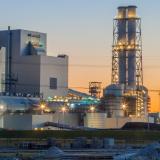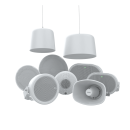
Shining a Light on Solar Field Protection
Elera Renováveis secures massive solar farm with fiber optic buried sensor cable and 16 Axis pan/tilt/zoom (PTZ) cameras integrated with precision by georeferencing control.

Planning a new solar farm
Elera Renováveis is one of the largest companies in Brazil to generate electricity from renewable resources. Its portfolio includes 44 hydroelectric plants and 19 wind farms. One of its recent acquisitions was a solar farm under development in Ceará in the northeast region of the country. At peak capacity, the new 2,051-acre project – equivalent to more than 800 football fields – generates about 360 megawatts of power, enough to serve the electricity needs of nearly a quarter million homes.
As owners of the solar project – named Complexo Solar Alex, or UFV Alex for short – Elera was faced with the challenge of how best to protect the property. “In a traditional security solution with fixed cameras and video analytics, we’d map the perimeter terrain of the field and install preset video cameras every 164 feet,” explains Bernardo Falcon, Executive Director of Aeon Security.
With eight miles of perimeter to cover, that would bring the number of cameras needed at UFV Alex to about 273. The cost of installing such a large quantity of equipment and then managing the volume of images and alerts generated would be overwhelming.
We took cameras from Axis and a competitor out to the solar farm to monitor the area and the performance from the Axis cameras in the unlit environment was remarkable. Plus Axis cameras are built on open standards which made integrating all the components easier.
Doing more with less
Elera hired Aeon Security, a systems integrator and Axis partner, to construct a more cost-efficient solution. Aeon’s innovative approach integrated Axis PTZ cameras with Aura Ai-2 fiber optic cable technology from Future Fibre Technologies. They covertly buried the highly sensitive cable along the solar farm’s fence line to instantly detect intrusions and send the coordinates to the Axis cameras.

The cameras use the geolocation data to automatically change their field of view to provide visual verification of the incident to security staff remotely monitoring the solar field. The security system also integrates Axis network horn speakers that can automatically broadcast prerecorded warnings to trespassers advising them that they are under surveillance or allow operators to intervene with a live message. The solution runs on a Digifort video management platform that includes alarm management.

“We chose the AXIS Q62 Series cameras, both for their reliable performance and ability to support georeferencing. Instead of operating on preset and fixed positions, the cameras can be precisely directed in real time to the invasion point without operator intervention,” says Falcon. It’s this ability to automatically change focus point on demand which allows Elera to effectively monitor the entire solar field with only 16 video cameras.
Having Axis horn speakers as part of the solution adds another level of security. “Even staff at Elera’s operation center in Rio de Janeiro can transmit messages in real time to UFV Alex if necessary,” shares Falcon.
Overcoming innovation skepticism
“Considering that other Elera sites used around 400 Axis cameras, it was natural to feel skeptical that only 16 Axis cameras and fiber optic cables could provide the kind of thorough coverage we needed along the extensive perimeter of the UFV Alex solar complex. But, not only does the Axis technology make it possible, it became a great economic and sustainable case for us and the customer.”
“Elera wanted to see a proof of concept before committing to the Axis/FFT solutions,” explains Falcon. “It was important to put the equipment through real-world testing to demonstrate that Axis would work seamlessly with FFT technology and the Digifort video management platform.”
In addition to long-distance daytime surveillance, exceptional night vision was paramount since the solar park has no nighttime lighting. Elera wanted to be sure that the cameras could capture clear images as far as a quarter mile away. Because of their built-in, long-range IR illuminators, the Axis cameras were able to exceed that distance, demonstrating they could capture sharp images of a night scene more than a third of a mile away. The heavy-duty PTZ cameras, provide Elera with reliable, around-the-clock, perimeter monitoring, even in extreme weather conditions and high winds, with few false alarms.
When testing the georeferencing interface between the cameras and the Aura Ai-2 fiber optic intrusion detection system, the Axis cameras consistently targeted the location within 11 feet.
Greater than expected return on investment
Energy efficiency was another plus. “The Axis cameras’ low power consumption makes them ideal for a solar farm environment where the power available at night is limited and costly,” shares Falcon.
Since these solar projects have a useful life of 20 to 25 years, the longevity and reliability of Axis cameras made them a sound investment. “Installing a camera with a life expectancy of 10-plus years gives a long equipment replacement cycle which optimizes Elera’s return,” points out Falcon.
Falcon also cites the importance of investing in robust technology that continues to operate, even under adverse conditions, with little need for recurring maintenance. “The cost of replacing a camera at the UFV Alex complex would be very high because the area is far from any major center. So repair crews would have quite a distance to travel,” says Falcon. The ruggedly constructed Axis cameras are built to withstand the toughest weather conditions – including rain, lightening and wind speeds up to 150 miles per hour – making them a good choice for the project.
Furthermore, having to replace a camera near a power line would require an operational stop, losing the company valuable production time. “That’s another reason why it’s vital for UVF Alex to have reliable equipment that doesn’t fail,” states Falcon.
Being able to dramatically decrease the number of cameras for the solar farm meant using considerably less cabling and infrastructure. “These are benefits that no one thinks about when developing the project,” says Falcon. “But the cost savings really mount up. We estimate that our optimized solution saved Elera over 3.5 tons of copper cable and nearly 1.8 tons of PVC piping.”
Extending the partnership to other solar projects
Elera has been pleased with the performance of this pioneering solution to solar farm security. “This is the first solar project in the world to integrate fiber optics detection and cameras with georeferencing capability. When added to the Axis cameras’ outstanding zoom and infrared range and long life-expectancy, we’ve achieved a system that is serving us effectively today and will continue to do so for years to come,” sates Alexander Fernandes de Assis, Network and Infrastructure Specialist at Elera Renováveis.
The success of the project has led the energy company to standardized on the solution for upcoming projects, including wind powered plants and the UFV Janaúba solar farm in Minas Gerais that is five times larger than UFV Alex.
Products & solutions

Critical infrastructure
Our partner organizations
Get in touch
Want to know how you can benefit from Axis solutions? Get in touch and we will help you.
Contact us
